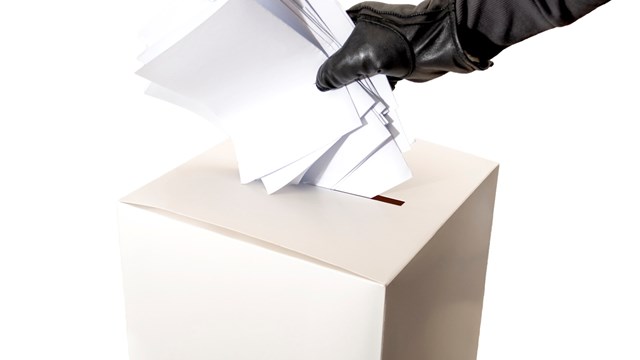When it comes to decision-making in your building, attending meetings in person is always best. But should the need arise, shareholders and unit owners are permitted to vote in board elections and other matters of corporate governance by proxy or absentee ballot. Proxies are a valuable part of the voting process, but boards need to be aware of the legal implications that can arise when proxies aren't handled properly, as well as the potential for abuse that can result in a subversion of the electoral process. A better understanding of these issues as well as how and why proxies are used and the technical rules governing their issuance and solicitation will greatly benefit your building's election process.
Authorization to Vote
Proxies are written statements by a shareholder or unit owner authorizing another person (the proxy holder) to vote his shares or common interests at a shareholders or special meeting. In some instances, such as a lease amendment vote, proxies may actually substitute for a meeting. The general proxy gives the proxy holder complete discretion to vote any way he wishes. The specific proxy provides the holder with explicit instructions as to how the owner wishes to vote. A hybrid format can also be used in which the proxy is general in nature, but space is provided for specific directions to the proxy holder.
Boards often rely upon the collection of proxies to fulfill the quorum requirement at the annual shareholders meeting or any special meetings, but may not use them at board meetings. Under statutory law and virtually every set of association by-laws, no official business (including board elections) may be conducted without the presence of a quorum, which usually consists of a majority of outstanding shares or common interests, in person or represented by proxy. It's a good idea to remind shareholders or unit owners in writing before the meeting to send in their proxies, if they will be unable to attend, so they can be counted toward the quorum. Include a stamped, self-addressed envelope for return of the proxy and follow up with a door-to-door or telephone lobbying effort. Shareholders and unit owners should be urged to submit a proxy even if they intend to be at the meeting. This way, if a last minute conflict makes it impossible for them to attend, their vote can still be counted.
Sometimes shareholders and unit owners refuse to furnish a proxy because they don't want to take a stand on a contested vote. This is especially true of sponsors or banks (that have acquired their units through foreclosure) that don't wish to take sides in a squabble between residents. Such a loss of votes can account for the failure to achieve a quorum; however this obstacle can be circumvented by providing a space on the proxy in which the proxy holder is instructed to record a vote for quorum purposes only, meaning that the vote is registered as part of the quorum but not counted for one side or another.
Sometimes board members undertaking a proxy solicitation are concerned that designating one or more of themselves as proxy holders creates an appearance of impropriety. In order to preserve the integrity of the electoral process, these boards may appoint independent employees or principals of the managing agent as proxy holders. Boards following this route should make absolutely certain that only a specific proxy form, giving the proxy holder no discretionary authority whatsoever, is used; otherwise the managing agent may be inadvertently handed the power to elect the board.
Rules Concerning Issuance
Many boards and dissident groups organize proxy solicitations to elect a particular faction of candidates. They not only mobilize the vote, but also marshall it in favor of the candidates whose election they are seeking. An organized lobbying effort is of paramount importance in this context; but, the rules concerning issuance, drafting and solicitation of proxies are also relevant, because any infraction could result in disqualification which defeats the purpose of their collection.
The cardinal rules regarding issuance of a proxy are that the document must be in writing, and it must be dated and signed by the record owner or his attorney in fact. Unless indicated otherwise, the term of a proxy is 11 months from its issuance. If multiple proxies are issued by the same shareholder, the only valid one is that which was issued latest in time.
Proxies signed by any person other than the owner of record are invalid unless accompanied by documentary evidence such as a duly executed Power of Attorney, Letters Testamentary or Letters of Administration that this person is signing as attorney in fact. If the record owner dies or is found incompetent after issuing of a proxy, the proxy is valid unless the association's secretary has been notified in writing prior to the meeting.
If the subject shares or common interests are jointly owned and a proxy is issued by only one of the owners, he is presumed to be acting on behalf of the other owners, and the proxy is considered valid and binding, unless a written notice from the dissenting joint owners is made to the association's secretary before the meeting. If the owners are evenly split, the votes are pro-rated. In the event of a disagreement between joint owners, and a majority favors one position (i.e., three joint owners split two to one), the majority preference rules as to how the vote should be counted.
Revoking Proxies
A shareholder or unit owner who changes his mind can issue a new proxy reflecting his revised preference. A proxy can also be revoked by written notice to the association's secretary. Or, a shareholder or unit owner can revoke the proxy by attending the meeting and casting a ballot that reflects the new preference. The ballot will supersede the previously issued proxy; however, merely attending the meeting, without actually casting a ballot, will not serve to revoke the proxy.
In most cases proxy forms designate more than one proxy holder. If the form is drafted to designate A or B as proxy holder, then either one may act independently of the other, and the actual bearer of the proxy is the one who gets to cast the votes. If, on the other hand, the proxy form is drafted to designate both A and B as proxy holders, they must act jointly in order for the proxy to be valid. This distinction is crucial when the proxy holders each represent different factions of candidates or different sides of an issue being voted upon. Proxies may not be purchased in exchange for money or anything else of value such as a promise of favorable treatment after the election. To the writer's knowledge, there are no court decisions with respect to the validity of fax proxies. But while the use of fax proxies would probably be upheld in the event of legal challenge, it is safer to enact a by-law amendment sanctioning their use.
Pitfalls to Avoid
An awareness of common pitfalls can help preserve the integrity of your association's future proxy solicitations. The overwhelming majority of proxy forms circulated by boards are general in nature, giving the designated proxy holder unfettered discretion in casting the votes represented by the proxy. Shareholders and unit owners should be told how the proxy holders intend to vote, so that the issuance of proxies becomes a process of informed consent. They should insist upon this kind of disclosure before issuing their proxies. Or they should change the proxy form to a specific proxy (initialling all changes to authenticate them) or compose their own proxy form. Individuals soliciting proxies might consider using the hybrid general/specific proxy form referred to above.
The issue of whether multiple proxy holders have joint or separate authority to cast the votes represented by a proxy can be critical. Joint authority should not be considered unless all of the proxy holders are firmly allied with each other on the slate of candidates to be elected or the issue being voted upon. If the shareholder or unit owner whose proxy is being sought is not comfortable with one or more of the designated proxy holders, he may make the appropriate deletions (initializing the changes) or simply substitute his own designated proxy holder. It's important to be aware that pre-dated proxy forms reflecting the day of the meeting or the day before the meeting are sometimes circulated. These proxies are illegal because they curtail the right to revoke a proxy before the meeting.
Whenever there is a contested election or issue, inspectors of election should be selected at the meeting. If the association's by-laws permit the appointment of inspectors, and at least one shareholder or unit owner demands such an appointment, compliance with the request is mandatory. Inspectors have the authority for resolving challenges to proxies in only two areas: Do the books of the association indicate that the person issuing the proxy is the record owner of the subject stock or common interests? Is the proxy, on its face, legally valid? Inspectors don't have the power to determine whether the shareholder or unit owner was legally competent when the proxy was issued, or whether the proxy is a forgery or was obtained under duress.
Inspectors are required under the Business Corporation Law to issue a written report of any challenge, question, or matter determined by them and execute a certificate of any fact found by them upon request of any shareholder or unit owner. Such findings, as well as any others that are outside their scope such as fraud, duress, forgery or incompetence to issue the proxy are subject to judicial review in a supreme court proceeding. However, the commencement of such a proceeding is subject to a strict 120 day statute of limitations.
Proxies are a useful tool, but even when handled correctly they are an imperfect substitute for attendance at association meetings. It is only at these forums that a full exchange of views between voters can occur.
Bruce Cholst is a partner at Rosen & Livingston, a Manhattan law firm specializing in the representation of co-op and condo boards.










94 Comments
Leave a Comment